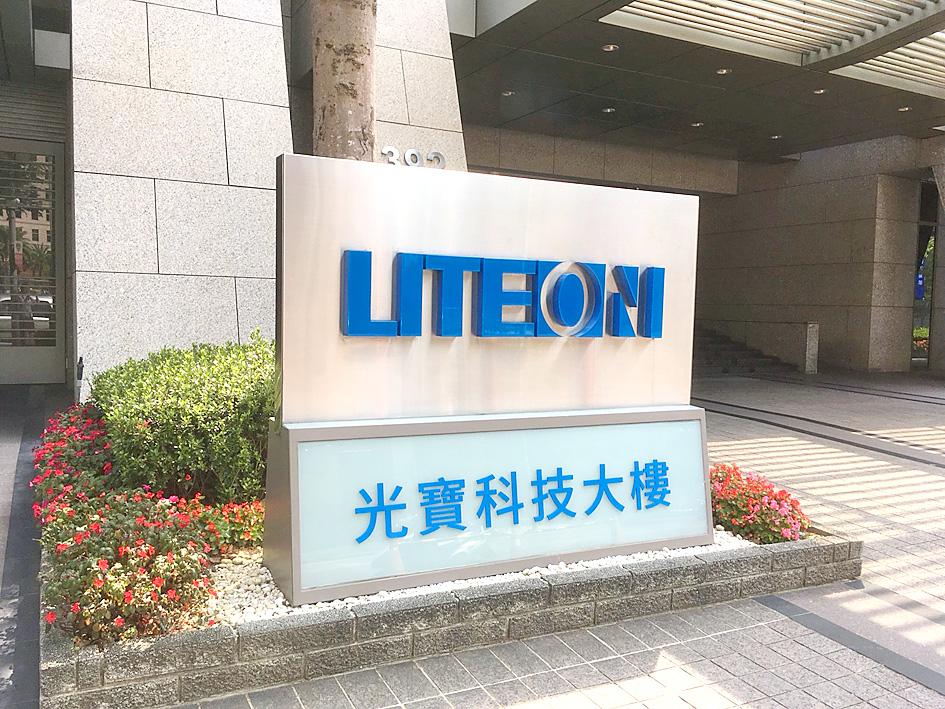Electronic components supplier Lite-On Technology Corp (光寶科技) yesterday said it expects revenue to grow at a quarterly pace of 10 percent this quarter, thanks to shipment delays of some automotive devices, computers and consumer electronics due to key component shortages.
The company’s revenue last quarter grew to NT$41.86 billion (US$1.49 billion) — its highest level in about seven quarters.
“The fourth quarter is normally an off-season ... but the third quarter [revenue] was affected by component and material shortages. We believe it should be okay to [expect] 10 percent revenue growth in the fourth quarter,” Lite-On president Anson Chiu (邱森彬) told investors in an online conference yesterday.

Photo: Chen Rou-chen, Taipei Times
The company was concerned about the chip shortage, but it altered its product designs at the beginning of this year to minimize the impact, Chiu said, adding that China’s electricity curbs have had a very limited effect on Lite-On as it has expanded capacity in Taiwan, Thailand and Vietnam.
Automotive electronics and cloud-based and artificial intelligence of things (AIoT) devices, both of which deliver a higher gross margin than the corporate average, would be the main growth drivers this quarter, extending last quarter’s robust growth momentum, he said.
The company also maintains an optimistic outlook for next year as its optoelectronics business is expected to grow 15 to 20 percent year-on-year, Chiu said.
Lite-On’s optoelectronics business, which offers outdoor lighting, automotive electronics and optoelectronic product solutions, contributed 20 percent to its revenue last quarter.
Its cloud and AIoT business made up 28 percent of the company’s revenue, with products including electronic components used in data centers, servers and smart devices.
Electronic components for information technology and consumer electronics products such as notebook computers and game consoles were the biggest source of revenue, making up about 52 percent, the company said.
Lite-On yesterday reported that net profit grew 3 percent to NT$3.08 billion last quarter from NT$2.99 billion a year earlier, thanks to robust demand for power units used in cloud computing devices, electric vehicles and PCs.
That represented a quarterly decline of 24 percent from NT$4.03 billion, after some impairment losses were booked.
Earnings per share rose to NT$1.33 last quarter from NT$1.29 a year earlier, but dropped from NT$1.74 in the second quarter.
Gross margin rose to 19.3 percent last quarter from 19 percent a year earlier, but declined from 19.7 percent in the second quarter.

South Korea’s equity benchmark yesterday crossed a new milestone just a month after surpassing the once-unthinkable 5,000 mark as surging global memory demand powers the country’s biggest chipmakers. The KOSPI advanced as much as 2.6 percent to a record 6,123, with Samsung Electronics Co and SK Hynix Inc each gaining more than 2 percent. With the benchmark now up 45 percent this year, South Korea’s stock market capitalization has also moved past France’s, following last month’s overtaking of Germany’s. Long overlooked by foreign funds, despite being undervalued, South Korean stocks have now emerged as clear winners in the global market. The so-called “artificial intelligence

NEW IDENTITY: Known for its software, India has expanded into hardware, with its semiconductor industry growing from US$38bn in 2023 to US$45bn to US$50bn India on Saturday inaugurated its first semiconductor assembly and test facility, a milestone in the government’s push to reduce dependence on foreign chipmakers and stake a claim in a sector dominated by China. Indian Prime Minister Narendra Modi opened US firm Micron Technology Inc’s semiconductor assembly, test and packaging unit in his home state of Gujarat, hailing the “dawn of a new era” for India’s technology ambitions. “When young Indians look back in the future, they will see this decade as the turning point in our tech future,” Modi told the event, which was broadcast on his YouTube channel. The plant would convert

‘SEISMIC SHIFT’: The researcher forecast there would be about 1.1 billion mobile shipments this year, down from 1.26 billion the prior year and erasing years of gains The global smartphone market is expected to contract 12.9 percent this year due to the unprecedented memorychip shortage, marking “a crisis like no other,” researcher International Data Corp (IDC) said. The new forecast, a dramatic revision down from earlier estimates, gives the latest accounting of the ongoing memory crunch that is affecting every corner of the electronics industry. The demand for advanced memory to power artificial intelligence (AI) tasks has drained global supply until well into next year and jeopardizes the business model of many smartphone makers. IDC forecast about 1.1 billion mobile shipments this year, down from 1.26 billion the prior

People stand in a Pokemon store in Tokyo on Thursday. One of the world highest-grossing franchises is celebrated its 30th anniversary yesterday.